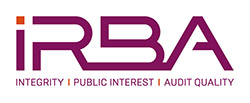Set aside of MAFR poses little risk to investors since the majority of public interest entity auditors have already rotated
|
Johannesburg, Thursday, June 1, 2023 – The Independent Regulatory Board for Auditors (IRBA) has indicated that the setting aside of the Mandatory Audit Firm Rotation rule (MAFR) by the Supreme Court of Appeal poses minimal risks to investors on a short-term basis as the majority of listed entities (91%) and public interest entities have already rotated audit firms thereby minimising the risk of independence threats as a result of long tenure. The benefit of these rotations will be in effect for at least the next five to ten years. Says Imre Nagy, CEO of the IRBA: “First I want to reassure the investment community that our monitoring statistics show that there has been a very positive uptake of voluntary rotation by companies and public interest entities in the lead up to the effective date of 1 April 2023. On this we want to commend those audit committees and audit firms for recognising the risks of long firm tenure and adopting the MAFR as a measure to mitigate such risks. Whether it is a real or perceived lack of independence, the shareholders and public will continue to question whether an audit firm is truly independent when reviewing financial statements in circumstances where they have audited the clients for longer than a decade.” While the IRBA respects the Supreme Court judgement, it must continue to pursue its mandate to protect public investors and assist government to grow the economy by restoring confidence in audits. As the audit regulator, it aims to create an enabling environment for registered auditors to produce high quality audits which investors can trust when making investment decisions. Says Nagy: “In safeguarding an auditor’s independence, we still believe that MAFR is the appropriate mechanism that strengthens auditor independence. The court’s judgement against the IRBA in this matter was on a technical legal basis and did not bring into question the value and/or effectiveness of MAFR. Therefore we stand by the principle of strengthening independence through regular rotation of firms. “As acknowledged by the Court in its judgment, audit firms play a pivotal role in ensuring that the representations made by companies in annual financial statements are reliable, accurate and portray a fair and balanced position of a company’s financial affairs. Accordingly, investors and the public rely on the accuracy of those representations to make investment decisions.” In recent years, the auditing profession has been marred both locally and globally by accounting scandals with dire consequences for investors and the public. The court correctly noted that the IRBA attributed the genesis of the problem (of corporate and/or audit failures) to the long tenure of audit firms, which in some instances had endured for 80 to 114 years. Says Nagy: “The court was correct in noting that at the time that the IRBA identified MAFR as the preferred measure to strengthen independence of auditors it was also highlighted that Chief Financial Officers, who hold sway in the decision to appoint an audit firm, are drawn from a limited pool of auditors, often from the same auditing firms. In addition, the acquaintance between audit committee chairs and incumbent auditors exacerbates the perception of a lack of independence and poses a threat to audit outcomes. This is what the IRBA Code of Professional Conduct (the Code) refers to as familiarity threats and specifically the independence threat of long tenure that MAFR is intended to mitigate. “Independence of registered auditors from their clients is a key principle of effective external audits and in addition to the rotation of partners every five years, the IRBA is of the view that rotation of audit firms further strengthens the independence of the auditor and the firm. While MAFR has been set aside, the independence provisions in the Code are still in effect and must be adhered to by the auditor. “We therefore encourage audit committees and registered auditors to continue to consider threats to independence and ensure that any independence threats are thoroughly identified and addressed by the auditor at the outset of the audit, especially where tenure exceeds ten years. In the code there are various steps an auditor can take to remedy a risk of impaired independence, such as involving another firm to perform or re-perform part of the engagement to address self-interest, self-review, advocacy, familiarity or intimidation threats.” Despite the importance of the role of auditors vis-à-vis audit quality, the protection and attraction of investors, as well as the need to address the problems currently facing the profession due to long audit tenure, the court identified the issue before it as one which was based on statutory interpretation, specifically, whether the IRBA had the statutory power to promulgate MAFR. Having considered the provisions cited in the promulgation of the MAFR through section 10(1)(a), the court found difficulty in placing the power to legislate MAFR therein, having found that the provision, while it empowers the IRBA to prescribe rules, such power is limited to matters ‘required or permitted’ to be prescribed by the Act. These matters are located in section 4 of the Act and confined to ‘the prescription of standards’ in respect of defined functional areas such as competency and professional standards. Since MAFR is not a standard of competence or a professional standard as contemplated in section 4 the court found its promulgation to be ultra vires the Act. The court has set aside the rule and therefore it is no longer mandatory to comply with MAFR. Concludes Nagy: “The issue therefore is not whether MAFR is or is not the right mechanism to increase independence, but rather that there was a difference of opinion on whether the Act allowed for the IRBA to issue the rule. We will therefore work urgently with parliament and stakeholders to address the technical issue raised in the judgment. I would like to re-emphasise to all parties to continue to ensure that auditors are free of influence and ensure that independence risks are thoroughly assessed and addressed in the public interest.”
Notes to Editors: Background to MAFR: The Mandatory Audit Firm Rotation (MAFR) rule came into effect for all audits of listed entities and non-listed public interest entities (PIEs) on 1 April 2023. This would have been the first year (1 April to 31 March 2024) in which MAFR was mandatory. MAFR limits audit firms to a maximum audit tenure of ten years. When the ten-year limit is reached, the audit firm is no longer eligible to continue to audit the client on the grounds of impaired independence. Independence is key to the quality of an audit; and The Code of Professional Conduct sets out many threats to independence which auditors must consider when accepting or continuing to audit a client. Since the MAFR rule was gazetted on June 5, 2017, the IRBA has monitored rotations of JSE-listed entities and public interest entities and has observed that many of those entities opted to take up early adoption of the rule ahead of its effective date this year.
More about the IRBA: The IRBA is a public protection statutory body established to protect the financial interests of the public by ensuring registered auditors and their firms deliver services of the highest quality. It upholds audit firm independence to ensure that audit quality is such that it enhances the accuracy and credibility of financial performance reporting. In this way, the IRBA has an important role to play in building the reputation of South Africa as an investment market for both local and global investors and driving economic growth for the country. The IRBA also registers suitably qualified accountants as auditors, who must adhere to the highest ethics standards, and promotes the auditing profession through the effective regulation of assurance conducted in accordance with internationally recognised standards and processes.
|





